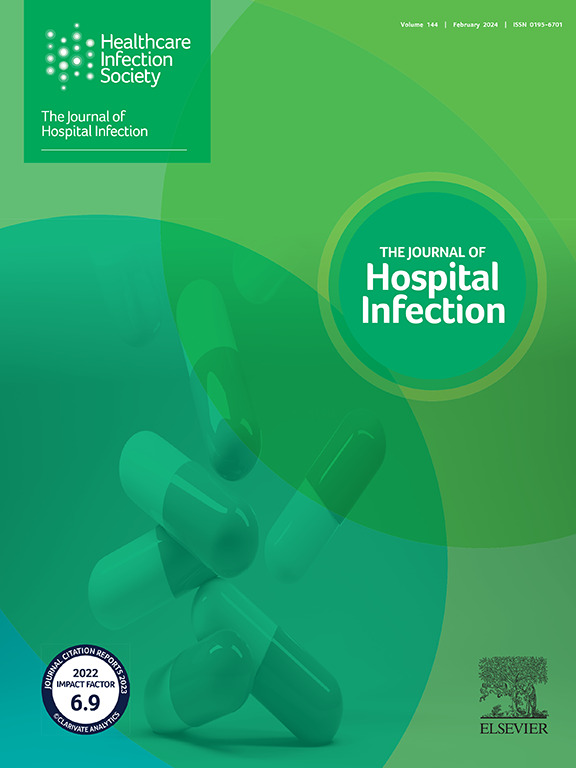Analysis of a persistent outbreak with vancomycin-resistant Enterococcus faecium revealed the need for an adapted diagnostic algorithm
IF 3.9
3区 医学
Q1 INFECTIOUS DISEASES
引用次数: 0
Abstract
Objectives
The study institute was challenged with an outbreak of different vancomycin-resistant Enterococcus faecium (VREfm), including vanA- and/or vanB-containing isolates. Remarkably, screening overnight enriched specimens using a vanA and vanB real-time polymerase chain reaction (PCR) gave positive results for vanB with very low cycle threshold values, whereas VREfm-specific enrichment cultures remained negative. This paper describes the analysis of the diagnostic results leading to adaptation of the diagnostic algorithm.
Methods
The results of vanA and vanB screening PCR and VREfm-specific culture (Brilliance VRE) were collected and combined with genotyping data of the identified VREfm isolates. During the outbreak, a second VREfm-specific culture medium (CHROMagar VRE) was introduced, and the results were compared with the results obtained with Brilliance VRE agar.
Results
Thirty-five patients were identified as VREfm carriers, in which four different strains were identified: vanA (STnew-CT7088) and/or vanB (ST80-CT1065, ST117-CT7117 and ST117-CT7118). Complementing the PCR results, culture and genotyping revealed that culture with Brilliance VRE agar was inadequate for detection of the vanB ST117 isolates identified, irrespective of the minimum inhibitory concentration of vancomycin. In contrast, CHROMagar VRE was able to detect the vanB ST117 isolates and other tested isolates correctly.
Conclusions
The vanB ST117 isolates were detected inadequately by the VREfm-specific culture media, possibly contributing to unnoticed spread of VREfm. For this reason, CHROMagar VRE was evaluated during the outbreak and subsequently implemented in routine diagnostics, replacing Brilliance VRE agar.
对耐万古霉素肠球菌(VREfm)持续爆发的分析表明,有必要调整诊断算法。
目的:我们所处的环境曾爆发过不同的耐万古霉素肠球菌(VREfm)疫情,其中包括含 vanA 和/或 vanB 的分离株。值得注意的是,通过使用 vanA 和 vanB 实时 PCR 对过夜增菌标本进行筛查,发现 VanB 阳性且 Ct 值极低,而 VREfm 特异性增菌培养结果仍为阴性。在此,我们将介绍诊断结果的分析,从而调整诊断算法:每个患者的标本都收集了 vanA 和 vanB 筛选 PCR 以及 VREfm 特异性培养(Brilliance VRE)的结果,并与已鉴定 VREfm 分离物的基因分型数据相结合。在疫情爆发期间,引入了第二种 VREfm 特异培养基(CHROMagar VRE),并将结果与 Brilliance VRE 琼脂的结果进行了比较:结果:35 名患者被确认为 VREfm 携带者,其中有四种不同的菌株被确认为 vanA(STnew-CT7088)和/或 vanB(ST80-CT1065、ST117-CT7117 和 ST117-CT7118)。PCR、培养和基因分型的补充结果表明,无论万古霉素 MIC 值如何,用 Brilliance VRE 琼脂培养都不足以检测出 VanB ST117 分离物。相比之下,CHROMagar VRE 能正确检测出这些 vanB ST117 分离物和其他检测到的分离物:我们的数据显示,VREfm 特异性培养基未能充分检测出含有 vanB ST117 的分离物,这可能导致 VREfm 在未被察觉的情况下扩散。因此,我们在疫情爆发期间对 CHROMagar VRE 进行了评估,随后将其用于常规诊断,取代 Brilliance VRE 琼脂。
本文章由计算机程序翻译,如有差异,请以英文原文为准。
求助全文
约1分钟内获得全文
求助全文
来源期刊

Journal of Hospital Infection
医学-传染病学
CiteScore
12.70
自引率
5.80%
发文量
271
审稿时长
19 days
期刊介绍:
The Journal of Hospital Infection is the editorially independent scientific publication of the Healthcare Infection Society. The aim of the Journal is to publish high quality research and information relating to infection prevention and control that is relevant to an international audience.
The Journal welcomes submissions that relate to all aspects of infection prevention and control in healthcare settings. This includes submissions that:
provide new insight into the epidemiology, surveillance, or prevention and control of healthcare-associated infections and antimicrobial resistance in healthcare settings;
provide new insight into cleaning, disinfection and decontamination;
provide new insight into the design of healthcare premises;
describe novel aspects of outbreaks of infection;
throw light on techniques for effective antimicrobial stewardship;
describe novel techniques (laboratory-based or point of care) for the detection of infection or antimicrobial resistance in the healthcare setting, particularly if these can be used to facilitate infection prevention and control;
improve understanding of the motivations of safe healthcare behaviour, or describe techniques for achieving behavioural and cultural change;
improve understanding of the use of IT systems in infection surveillance and prevention and control.
 求助内容:
求助内容: 应助结果提醒方式:
应助结果提醒方式:


